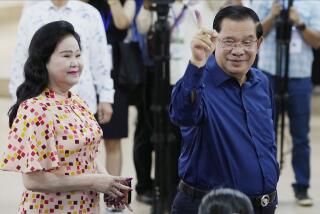Media : U.N. Chafes at Exit Polls, Press Critics in Cambodia : Journalists only care about âfire and blood and bullets,â a spokesman complains.
PHNOM PENH, Cambodia â When the United Nations takes control in a war-ravaged country, what standards should it apply in its relations with the news media? Should it strive for the complete freedom found in Western countries, or do higher concerns, such as peace and security, dictate a different standard?
Those questions underlie strains between the United Nations and the press here that came to a head with media coverage of last weekâs elections for a Cambodian Constituent Assembly.
Two Japanese news organizations were censured by the United Nations for defying a ban on conducting exit polls--surveys of voters in which news organizations try to get a jump on the actual voting returns. The U.N. Transitional Authority in Cambodia, which oversaw the election, was concerned that the sight of reporters interviewing around polling stations might frighten away potential voters.
During the campaign, it was reported that officials of the Phnom Penh administration had told voters unfamiliar with the election process that they had ways of finding out how each person voted, using special cameras and other secret devices. To counteract such propaganda, the United Nations prohibited journalists from taking cameras near the polling stations and forbade them to ask voters how they had voted.
But the two Japanese organizations, Kyodo News Service and Jiji Press, defied the order and published the results of their exit polls while the voting was still under way. Their surveys suggested that the royalist party known as FUNCINPEC had taken a substantial lead over the Cambodian Peopleâs Party of the Phnom Penh administration.
The Kyodo poll was based on interviews with 415 voters in four major cities. But 80% of Cambodiaâs population lives in rural areas, and there were serious questions about the validity of sampling only in cities.
U.N. officials were furious at the breach.
âSurveys of this sort are totally non-scientific and their findings do not have any basis. Moreover, they show a certain amount of disregard for the Cambodian people, possibly compromising their safety as well as perceptions of the secrecy of the ballot,â said Eric Falt, UNTACâs spokesman.
Neither organization responded to the U.N. complaint--the United Nations is powerless to enforce the ban--but the incident highlighted what has become a tense relationship between a number of reporters and U.N. officials.
Apart from the limitations at the polls, the U.N. operation here has been generally wide open to news coverage, with daily briefings for the 500 journalists who arrived to cover the elections. The United Nations has made available planes and helicopters to let journalists view voting in the countryside, and U.N. officials have spoken frankly about problems in conducting the vote.
But the officials are disappointed that coverage of the U.N. mandate has been dominated by fighting in the country rather than other aspects of the peace process, including what are considered UNTACâs successes.
âFor a long time we have been getting very negative press coverage, especially in the regional press,â said Falt, a former French diplomat who conducts the daily briefings. âItâs affected the morale of UNTAC people when day after day youâre subjected to so much criticism.â
Officials have been particularly upset at articles suggesting that little of the $2.6 billion spent by the United Nations has reached Cambodians, having been spent instead on cars and fat living allowances for U.N. personnel.
âItâs a specious argument because a U.N. officialâs salary and allowances are not related to the annual income of Cambodians any more than are the salaries and expenses of journalists covering the election,â one U.N. official fumed.
As long as a year and a half ago, U.N. officials asserted that news reports about fighting in Cambodia were making it difficult for the United Nations to recruit staff for the peacekeeping project. Families of U.N. officials were evacuated from Phnom Penh before the voting after news reports speculated about the possibility of an offensive by Khmer Rouge guerrillas--which never materialized.
âEver since weâve been here, anything coming out of Cambodia was fire and blood and bullets,â Falt said. âNothing else seemed to catch the interest of the correspondents. The crucial problem of reconstruction which has not been possible because of the lack of funds, for example, was never covered. . . .â
Many U.N. officials now feel a sense of vindication because so many journalistic predictions of violence during the elections failed to materialize and voter turnout exceeded even the most optimistic U.N. projections.
âWeâre not going to say, âI told you so,â but there is a certain amount of revenge in the turnout,â Falt said with a smile.
More to Read
Sign up for Essential California
The most important California stories and recommendations in your inbox every morning.
You may occasionally receive promotional content from the Los Angeles Times.










